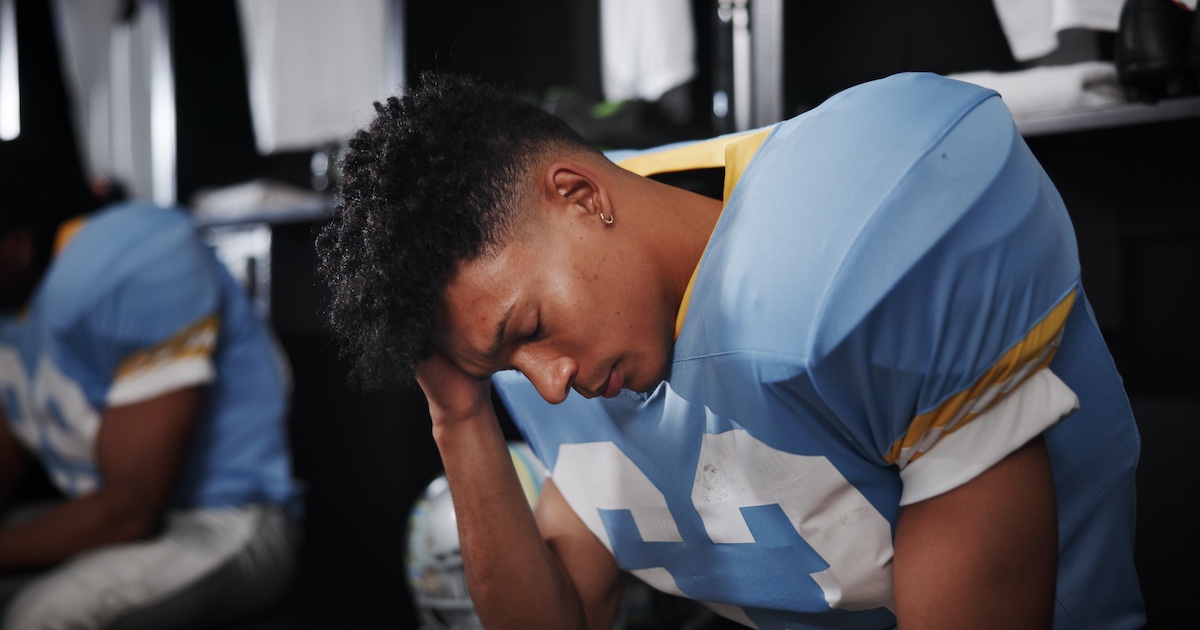
If you’re an athlete, taking a “minor” hit to your head during a game or practice may not seem like a big deal – especially because it happens often in contact sports like football or even cheerleading. Head injuries are not always taken seriously or reported by athletes, causing concussions to commonly go unrecognized and underreported.
Hits caused by contact sports are associated with 45% of all ER visits for head injuries in children under 17. Learn the short- and long-term effects of concussions, what causes them and when to seek care.
A concussion is a mild traumatic brain injury that occurs when your brain moves and hits the inside of your skull after a fall or blow to the head.
According to the CDC, the risk of head impact is highest in tackle football with youth football players (ages 6-14) sustaining an average of 375 head impacts per season.
Unlike minor head injuries, such as bumps and bruises, a concussion causes chemical changes that temporarily affect how your brain functions, resulting in a wide range of symptoms.
Concussion symptoms may start immediately, or they could take hours or even days to develop, making them sometimes hard to recognize. These effects are considered “short-term” if they last a few days or less.
The most common short-term signs of concussion include:
These symptoms may also be mistaken for other medical issues, especially if there are no visual signs of injury.
While less common than short-term concussions, the symptoms of a long-term concussion can be severe and last weeks to even years.
All athletes are especially vulnerable to concussions. Kids are most susceptible to long term symptoms of concussions due to their ongoing brain development.
How long does a concussion last?
The length of concussion can vary based on age, sex, the severity of the injury, and more. While a mild concussion takes 1-2 weeks for full recovery, recovery from a severe concussion takes months to years. Recovery time can increase if someone has had prior concussions or does not seek care immediately.
What happens if you get multiple concussions?
One concussion doesn’t usually cause lasting brain damage. But experiencing multiple concussions over a lifetime – or even a few rough fall sports seasons – can permanently alter how your brain works, increasing risk of developing dementia, Chronic Traumatic Encephalopathy (CTE) and more. Studies show that the risk of CTE doubles after three years playing football. This risk is associated with all repetitive head impact exposure, not just concussions.
Allowing your brain time to heal after a concussion is crucial. Getting a second head injury before you have fully healed can result in second-impact syndrome, which causes rapid and potentially fatal brain swelling.
Here’s a simple rule to follow: When in doubt, sit out. After a suspected hit occurs, stop playing and monitor closely for any changes in symptoms, especially for the first 24 hours, also:
Some athletes may feel pressured to continue playing or downplay their symptoms – and that’s when it’s time to step in. Seek medical attention immediately if you have any persistent, severe, or worsening concussion symptoms or lose consciousness, even for just a few seconds.
If you are experiencing mild concussion symptoms, a vybe clinician can assess you to rule out other injuries and diagnose your concussion. vybe can also offer you guidance on the next steps for support, including providing referrals to appropriate medical professionals for ongoing care and concussion management.
When you or someone you care about needs a concussion assessment, vybe urgent care is here to help. All vybe locations are open 7 days a week with extended hours for your convenience. Walk in or schedule an appointment today!
FIND YOUR VYBE